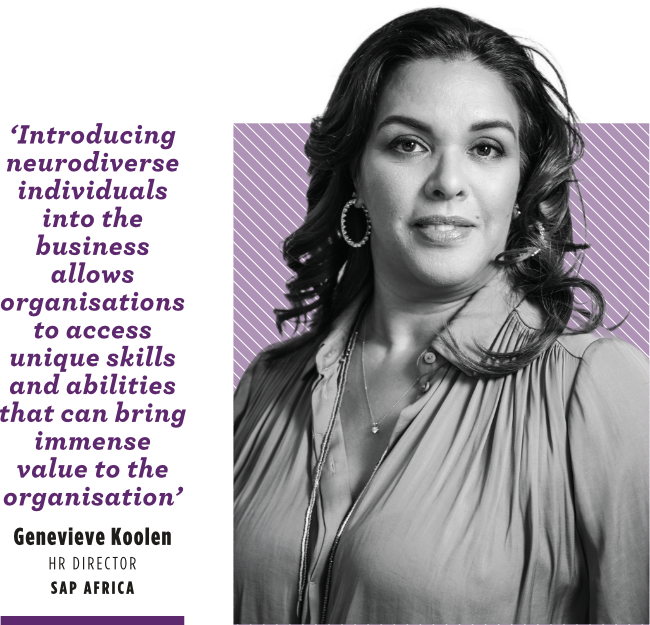Diversity in the workplace… Of course it’s a concept we’re all familiar with and indeed, the vast majority of companies have policies in place to promote inclusion regardless of race, gender or sexual identity. Yet there is another aspect of diversity that is rapidly gaining momentum – neurodiversity. Defined by the UK’s Tavistock Institute of Human Relations as ‘a concept that recognises and respects neurological differences in individuals’, neurodiversity ‘celebrates the idea that neurological variations such as autism, ADHD, dyslexia, dyspraxia, Tourette syndrome and Down syndrome and others, are a natural part of human diversity. Between 15% and 20% of the global population is estimated to be neurodivergent’.
Everyone is ‘wired’ differently. However, for some neurodivergent people, these distinctions can carry notable significance. And despite being able to add much value to a workforce, neurodiverse individuals often encounter considerable barriers in accessing employment and navigating the workplace.
Stigma and discrimination often come into play as a result of misconceptions and stereotypes surrounding their conditions. This can manifest in hiring biases, limited career advancement opportunities and social exclusion.
‘Currently, unemployment for neurodivergent adults runs as high as 30% to 40%,’ says Susan Fitzel, an international neurodiversity speaker, consultant and trainer. ‘Yet, at least 70% of employers worldwide, especially in the STEM and manufacturing fields, are having trouble filling open positions.’
Many employers and staff also lack awareness and understanding of neurodiversity, leading to misunderstandings about the capabilities and support needs of neurodiverse people, who might also struggle to navigate unsupportive work environments characterised by sensory overload, social expectations and communication barriers. Without adequate adjustments, these environments can exacerbate stress and anxiety, impacting job performance and well-being.
Traditional recruitment processes, too, can inadvertently disadvantage neurodiverse candidates, who may struggle with standard interview formats or assessments that do not accommodate their unique strengths and challenges. As a result, neurodiverse individuals often face barriers to entry into the workforce.
However, neurodiverse people possess unique strengths, talents and perspectives that can enrich workplaces and drive innovation. For instance, those with autism often exhibit exceptional attention to detail and pattern recognition, while individuals with ADHD may excel in environments that demand creativity and adaptability. Harvard Business Review, for instance, notes that when autistic professionals are appropriately matched to their roles, they can be up to 140% more productive than their neurotypical counterparts.
Ultimately, by embracing neurodiversity, organisations can tap into this diverse talent pool and harness the full potential of their workforce – and SA businesses are taking note.As Ceara Metcalf, director of payroll and HR strategy at Sage explains, ‘neurodiversity has moved further up the workplace agenda, with a positive awareness of how neurodiversity can be genuinely beneficial to organisations’.
Neurodiversity brings unique perspectives, problem-solving skills and creativity to the workplace, driving innovation and fostering a culture of diversity and inclusion. And by leveraging the strengths and talents of neurodiverse talent, companies can enhance productivity, efficiency and performance across various roles and functions.
Embracing neurodiversity expands the talent pool, enabling companies to access a broader range of skills, experiences and perspectives – enhancing their competitive advantage in the marketplace. This is why it is important to create an inclusive workplace culture that values diversity, and inclusion promotes employee morale, engagement and satisfaction. Employees who feel valued, respected and supported will have higher levels of motivation and commitment.
According to Genevieve Koolen, HR director at SAP Africa, companies aiming to cultivate more inclusive and diverse workplaces should prioritise transparency and empathy in the hiring process for neurodiverse employees.
‘Introducing neurodiverse individuals into the business allows organisations to access unique skills and abilities that can bring immense value to the organisation,’ she says. ‘But this requires a rethink of hiring programmes, recruitment processes and team management, and greater flexibility to empower neurodiverse employees with career pathways that allow them to apply their unique skills and perspectives to tasks and opportunities.’
In 2013, SAP introduced its Autism at Work programme, which aims to increase awareness and foster employment opportunities for staff across diverse neurodiverse categories. Candidates are encouraged to submit their applications for roles that align with their qualifications and interests. Subsequently, managers with available positions can contact the local lead of the Autism at Work initiative in their respective country to establish connections with candidates from the programme’s talent pool. Additionally, opportunities for recruitment are advertised through the local partner networks, alongside conventional recruiting avenues.
‘Today, our workforce has 215 colleagues diagnosed with autism across 15 countries, who all contribute to the success of the business,’ says Koolen. ‘Having a programme that embraces neurodiversity enables us to find great talent that we’d otherwise potentially miss. It also enables us to leverage the unique abilities and perspectives of people on the spectrum to foster innovation.’
Take Nico Neumann, for example, who joined SAP’s finance team via the SAP Autism at Work programme in 2016. Based in Buenos Aires, Argentina, Neumann developed a tool that automates the posting of complex invoices with multiple cost allocations.
‘Prior to the development of this tool, accounts payable needed two to three days to manually process large credit card statements such as American Express with over 20 000 accounting lines,’ says Koolen. ‘Thanks to Nico’s innovation, that processing time has reduced to 20 minutes.’ Neumann’s solution won the Hasso Plattner Founders’ Award, SAP’s highest internal accolade.
Creating an inclusive and accommodating workplace for neurodiverse employees requires a concerted effort to foster a supportive environment. Key strategies include promoting awareness and understanding of neurodiversity among employers, managers and colleagues through training programmes, workshops and educational resources, to challenge stereotypes and misconceptions.
‘Regular awareness sessions help employees develop a deeper understanding of neurodiversity and encourage empathy with those who may view the world differently,’ says Koolen. Flexible work policies should also be put in place to accommodate the unique needs of neurodiverse talent, be it flexible scheduling or remote work options.
Importantly, to attract neurodiverse talent, recruitment practices need to be more inclusive and accessible to potential candidates. Alternative assessment methods, such as skills-based interviews, work trials or job simulations that focus on candidates’ abilities rather than perceived deficits should be considered.
‘The traditional interview process can introduce immense stress to neurodiverse candidates and undermine their ability to convey their unique skills, competencies and aptitudes. By finding ways to relieve stressful situations, companies can easily allow neurodiverse candidates to display their full potential during the hiring process,’ says Koolen. ‘Specialised skills assessments can also take the place of interviews, allowing companies to evaluate a candidate’s competence for specific tasks or roles.’
Lastly, mentorship programmes and peer support networks can go a long way in providing crucial guidance, encouragement and social connections for neurodiverse employees. As Koolen explains, ‘employees should also be encouraged to provide ongoing support to their colleagues to make it a company-wide effort, not just something driven by the HR department’.
It goes without saying that recognising and accommodating the diverse needs and talents of all staff, companies can create a more equitable and supportive environment where employees can thrive. Nurturing neurodiversity in the SA workforce is, therefore, essential to foster inclusivity, innovation and sustainable growth. However, achieving meaningful change requires collective action from employers, policy-makers, educators and society as a whole to break down barriers and build a more inclusive workforce.









